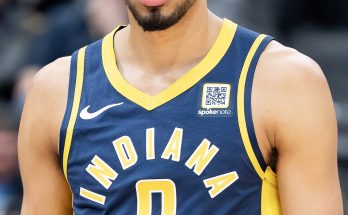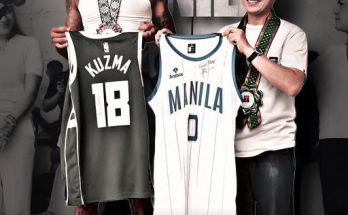In the modern era of college football, where the boundaries between loyalty and opportunity are increasingly blurred, one player’s decision has struck a nerve across the sport. Miami Hurricanes offensive lineman Francis Mauigoa, one of the most coveted talents in the country, has reportedly rejected an eye-popping $8.7 million Name, Image, and Likeness (NIL) deal from the Tennessee Volunteers. The move not only signals a deep commitment to the Miami program but also sheds light on ongoing tampering issues that continue to plague the NCAA’s new landscape.
According to multiple sources close to the situation, the Vols made an aggressive play to lure Mauigoa into the transfer portal with the promise of what would have been one of the richest NIL packages ever offered to a college offensive lineman. However, Mauigoa declined the offer, choosing instead to remain with the Hurricanes and report the incident to Miami’s compliance department—effectively cutting off what some insiders are calling a clear-cut case of tampering.
Mauigoa, a former five-star recruit out of IMG Academy and one of the foundational pieces of head coach Mario Cristobal’s rebuild in Coral Gables, was said to be “offended” by the nature of the approach. The lineman, who started every game as a freshman and is widely considered a future first-round NFL draft pick, has embraced a leadership role on the Hurricanes and made it clear that his loyalty cannot be bought.
While NIL has undeniably transformed college sports for the better in many respects—giving student-athletes the chance to finally benefit from their own marketability—it has also opened a Pandora’s box of behind-the-scenes dealing. The line between legal recruitment and illegal tampering is increasingly difficult to enforce. Schools are not supposed to directly contact players on other rosters unless they enter the transfer portal. However, the system is rife with backchannel communication, third-party involvement, and “shadow agents” pushing lucrative opportunities.
In Mauigoa’s case, the offer reportedly came through intermediaries linked to Tennessee’s NIL collective. The package included guaranteed income over two years, a brand ambassadorship with multiple Tennessee-based companies, a luxury car deal, and access to an exclusive housing arrangement near the Knoxville campus. Though the deal was never officially on paper—allowing plausible deniability for all parties involved—the dollar figure was solid enough to raise eyebrows within Miami’s athletic department.
“This was the kind of thing that could have fractured our locker room,” a Miami staffer said anonymously. “But Francis handled it like a pro. He brought it to our attention immediately. That’s the kind of leader he is. He’s about building something here, not chasing the next big dollar.”
In the aftermath of the incident, Miami has reportedly submitted a formal inquiry to the ACC and NCAA, flagging what they believe to be a violation of recruiting protocol. Though the NCAA has long struggled to police tampering in an NIL-driven landscape, Miami’s proactive steps may help set a precedent—or at the very least, call attention to what many coaches and administrators consider a growing crisis.
Meanwhile, Tennessee has remained silent on the issue. Officials within the program declined to comment, but sources indicate that the Volunteers are “frustrated” that the attempted recruitment of Mauigoa has gone public. The school has been under increased scrutiny in recent months for its aggressive NIL strategies, particularly after landing several top-tier transfers with reportedly massive compensation packages. Critics argue that Tennessee’s approach, while not technically illegal under current guidelines, walks the razor-thin line between competitive ambition and outright tampering.
This is not the first time Tennessee has been in the spotlight for NIL-related activity. Last year, rumors swirled around the recruitment of multiple SEC starters who were believed to have been contacted while still active on their rosters. Though no formal penalties were assessed, the smoke has not cleared entirely. With Mauigoa’s rejection now making headlines, it may be harder for programs to continue skating by unchecked.
For Miami, Mauigoa’s decision is a rallying point. After an up-and-down 2024 season that saw flashes of brilliance overshadowed by inconsistency, the Hurricanes are poised for a breakout year in 2025. Mauigoa is a central figure in that ambition, anchoring a veteran offensive line expected to be one of the most physical in the ACC. His commitment to the program sends a powerful message—not just to teammates and fans, but to every player navigating the temptations of a chaotic NIL marketplace.
Cristobal, known for his intensity and relentless work ethic, has been adamant about building a culture rooted in toughness, accountability, and pride. Mauigoa embodies those values, and his refusal to leave when a life-changing sum of money was dangled in front of him adds a new layer to that culture.
“This was a defining moment,” said one Miami assistant. “It showed everyone in our building that Francis isn’t just here for the ride. He’s here to finish what he started.”
For Mauigoa, the decision seems to be more about legacy than luxury. The lineman has openly talked about his desire to bring Miami back to national prominence, to help reestablish the Hurricanes as a perennial College Football Playoff contender. That vision, he believes, is within reach—and it’s a dream that can’t be bought or sold, regardless of how many zeros come at the end of a contract.
His stance also comes at a critical time for the sport. The NCAA is currently under intense pressure to clarify and enforce NIL guidelines more rigorously. With the introduction of new NIL regulations expected later this year, high-profile cases like this could shape the direction of future reforms. Many in the industry are advocating for a standardized NIL registry, stricter rules on third-party involvement, and harsher penalties for tampering violations.
Mauigoa’s refusal to entertain the offer—let alone act on it—may end up being a landmark moment in the ongoing battle for integrity in college football. By turning down a deal that most young athletes would find irresistible, he’s not just staying at Miami; he’s planting a flag in the ground for a different kind of college football career—one rooted in loyalty, team, and unfinished business.
As the Hurricanes prepare for summer camp and a highly anticipated 2025 campaign, the message is clear: Francis Mauigoa is not for sale. And Miami, for all the outside noise and temptation swirling around it, is still a place where belief and brotherhood trump bank accounts.
In an era where NIL money talks louder than most coaching speeches and player development pitches, Mauigoa’s decision to stay quiet, stay grounded, and stay loyal may just be the loudest statement of all.



